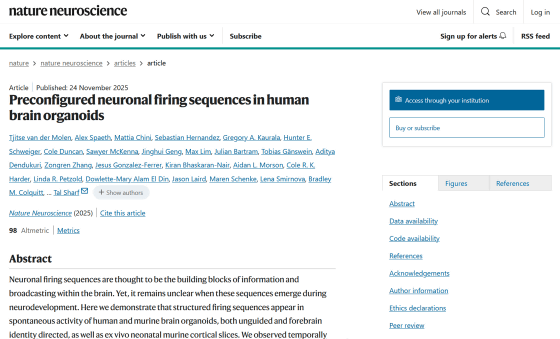The human brain may know how to understand the world before experiencing the senses

Researchers have long wondered whether the brain's thought patterns are innate or whether they are formed in response to experience. A research team from the University of California, Santa Cruz, recently announced the results of a study suggesting that the human brain may already be given instructions on how to understand the world before it experiences any sensory experience.
Preconfigured neural firing sequences in human brain organoids | Nature Neuroscience

Evidence suggests developing early human brains are preconfigured with instructions for understanding the world - News
https://news.ucsc.edu/2025/11/sharf-preconfigured-brain/
The brain, like a computer, operates through electrical signals, or the firing of neurons . However, because the developing human brain is protected by the mother's womb, it has been difficult to study when neurons begin to fire in the human brain.
However, in recent years, cerebral organoids, 3D models of brain tissue grown from human stem cells, have become a valuable tool for studying the early development of the brain because they can be ethically grown in large quantities and exist in a laboratory environment rather than in the body.
The research team created brain organoids from human and mouse stem cells and measured their electrical activity using special microchips. 'Organoid systems, which are essentially isolated from sensory input and communication with other organs, offer a window into what is happening in this self-organizing process,' said co-author Tal Scharf of the University of California, School of Engineering.

Observations of brain organoids revealed that during the early stages of development, before the human brain is able to receive and process complex external sensory information such as vision and hearing, neurons begin to spontaneously emit electrical signals with characteristic patterns that form the basis for sensory translation.
Scharf and his colleagues also observed neuronal spikes in the brain organoids and found that the initial patterns of neuronal activity had a striking similarity to the brain's 'default mode,' a fundamental underpinning of neuronal firing that changes to more specific patterns when the brain processes specific signals, such as smell or taste.
These observations suggest that early in development, neurons fire in complex, time-based patterns even before the brain receives any sensory input, potentially providing instructions on how to understand the world before any sensory experience is present.
'These cells clearly interact with each other and form self-organized circuits before they have any experience with the outside world. There's a primitive operating system that emerges,' Scharf said. 'The fact that we can observe these early stages of brain development suggests that evolution has figured out how to build maps in the central nervous system that allow us to navigate and interact with the world.'

Advances in research into the early developing brain will help us better understand human neurodevelopment and disease, and pinpoint the effects of pesticides and microplastics on the brain. 'This will enable us to collaborate with clinicians at the preclinical stage to develop cheaper, more efficient, and higher -throughput compounds, drug therapies, and gene-editing tools,' said Scharf.
Related Posts:
in Science, Posted by log1h_ik







